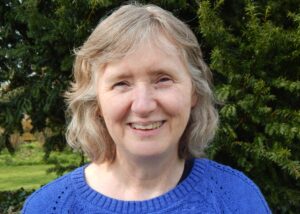In conversation with Dr Rhian Jones – Reader in Isotope Geo and Cosmochemistry
Meet the Department 15 July 2019

Dr Rhian Jones is Reader in Isotope Geo & Cosmochemistry and Admissions Tutor for Earth and Environmental Sciences at the University of Manchester. In the interview below, she reflects on how she became interested in science, why meteorites are fascinating, aspects of her role at Manchester, and how her academic career has progressed.
Can you describe your research for the layman?
My research is based around studying meteorites. I am particularly interested in meteorites called chondrites. These are made up of bits and pieces of dust from the time when the solar system was just forming, over four and a half billion years ago. Studying chondrites also means we can learn about what asteroids are made of, and the geological forces that have happened on asteroids through time. I look at the way all the mineral grains are put together in these rocks, and analyse the chemistry of the mineral grains, to understand how chondrites formed and how the solar system began.
How did you first get interested in your research area?
I first got interested in meteorites completely by accident. After my PhD, which I did here at the University of Manchester, I was offered a chance to do a postdoc working on meteorites, in Albuquerque, New Mexico. Even though I didn’t know anything about meteorites, it sounded like an exciting adventure and a good opportunity to explore the Southwest USA, so I went. It turned out that I became very interested in meteorites, and I have continued to study them ever since, which is now over 30 years.
How has working in Manchester benefitted your research?
I was at the University of New Mexico until 5 years ago, when I moved back to Manchester. I moved here to join my colleagues in our very active and highly regarded Planetary Science group. Moving here has meant that I could establish new collaborations, and start new projects using different kinds of analyses.
Who or what first inspired your interest in science?
The people who first inspired my interest in science were my high school teachers. They made science interesting and fun. We learned the beauty of how things work in chemistry and physics by exploring them ourselves in experiments. Another big influence on what became my career was a family visit to the Natural History Museum in London, where I was completely entranced by the mineral gallery. Seeing case after case of different minerals of all colours and shapes, all made from different chemical elements, started a deep fascination for me that has never gone away.
Describe your role in the School.
My role is a mix of research, teaching, and administration. I carry out my own research, which involves doing lab work to investigate new questions, and writing up papers. I teach geochemistry for first year undergraduates, and a class on meteorites and Moon samples for second years. I also advise students who are doing independent research projects, and supervise postgraduate student theses. I am currently the Admissions Tutor which means that I am the academic lead for the School’s recruitment and admissions activities.
What are you proudest of in your career to date?
I think the thing I am proudest of about my career is that I have stuck with it and managed to succeed in the academic world as well as raising two children. A lot of attention is given to women in science these days, but it hasn’t always been like that. As an undergraduate (in Chemistry) I only had a handful of lectures from the only female science academic I encountered in four years, and the concept of mentoring didn’t exist. Things have changed for the better now, but there is still a long way to go before women are truly integrated into science.
What are your hobbies or interests outside of work?
Outside work I like to spend time with my family and friends. I enjoy spending time outdoors, walking in the countryside. I play the piano at home, and my violin in a community orchestra. I’m also a member of my local Astronomical Society through which I can keep up with new science from listening to visiting speakers.
The blog for the University of Manchester’s Isotope Cosmochemistry and Geochemistry Group (Earth and Solar System) can be found here.
Dr Rhian Jones recently appeared on BBC Radio 4 Inside Science to discuss analysing moon rocks.



Leave a Reply